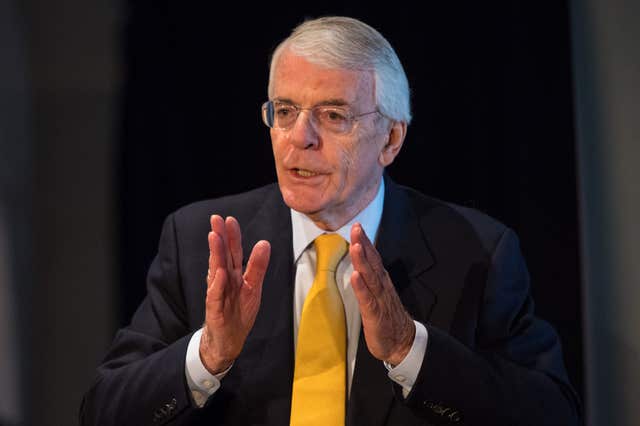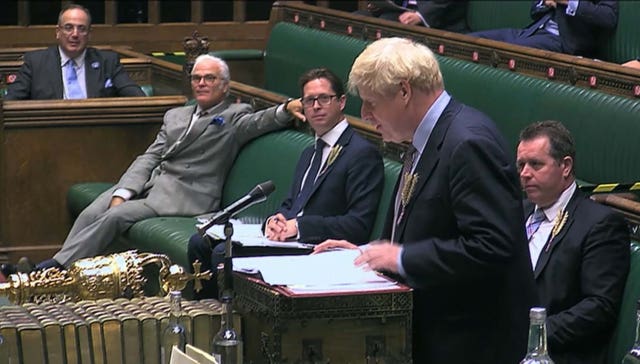EU calls for urgent talks on Johnson’s Brexit deal changes
The Prime Minister told MPs the legislation will provide a ‘legal safety net’ to prevent ‘a border down the Irish Sea’.

The European Commission has called for urgent talks with Britain as the Government set out its plans to override key elements of the Brexit deal signed by Boris Johnson.
Commission president Ursula von der Leyen said she was “very concerned” following the tabling in Parliament of the UK Internal Market Bill, which ministers have admitted will breach international law.
As talks continued in London on a post-Brexit free trade agreement, she said such actions would “undermine trust” and called on the Prime Minister to honour his past commitments.

Her warning came as Sir John Major became the latest senior Conservative to denounce Mr Johnson’s decision to go back on assurances he had made in an internationally binding treaty.
“For generations, Britain’s word – solemnly given – has been accepted by friend and foe. Our signature on any treaty or agreement has been sacrosanct,” the former prime minister said in a statement.
“Over the last century, as our military strength has dwindled, our word has retained its power. If we lose our reputation for honouring the promises we make, we will have lost something beyond price that may never be regained.”
Ministers have argued legislation is necessary to protect the Northern Ireland peace process if the two sides are unable to agree a free trade deal before the current Brexit transition period runs out at the end of the year.
However, commission vice president Maros Sefcovic said he was seeking an urgent meeting of the joint EU-UK committee on the Brexit Withdrawal Agreement to enable the British to “elaborate” on their plans.
Speaking at a news conference in Brussels, Mr Sefcovic said he had raised his concerns in a phone call on Tuesday with Cabinet Office minister Michael Gove – his co-chair on the committee.
“The Withdrawal Agreement is not open for renegotiation and we expect the letter and the spirit of the Withdrawal Agreement will be fully respected. I think on that we have to be very, very clear,” he said.

In the Commons, Mr Johnson defended the legislation, saying it provided a “legal safety net” to protect against “extreme or irrational interpretations” of the Northern Ireland provisions of the agreement which could lead to the creation of “a border down the Irish Sea”.
However, Mrs von der Leyen tweeted: “Very concerned about announcements from the British government on its intentions to breach the Withdrawal Agreement. This would break international law and undermines trust.
“Pacta sunt servanda (agreements must be kept) = the foundation of prosperous future relations.”
A UK Government spokesman said it welcomed Mr Sefcovic’s request for an additional meeting of the joint committee and would be looking to agree a date with his team.
In a further move, Business Secretary Alok Sharma announced he would be tabling secondary legislation to remove “redundant” EU state aid rules from the UK statute book.
In a Commons written statement, he said that from January 1 the UK would follow World Trade Organisation rules and Parliament alone would have the power to regulate subsidies for business.
The Bill, tabled in the Commons, states that “special regard” must be given to Northern Ireland’s place in the UK internal market and that there should be no new checks on goods moving from Northern Ireland to Great Britain.
It gives ministers the power to modify or “disapply” rules that come into force from the start of next year if the UK and the EU are unable to come to alternative arrangements through a trade deal.
Similar powers would apply over the issue of state aid, effectively giving the UK the ability to override obligations within the Withdrawal Agreement agreed prior to Brexit.
At Prime Minister’s Questions, Mr Johnson said his priority was to preserve the Good Friday Agreement and the Northern Ireland peace process.
“To do that we need a legal safety net to protect our country against extreme or irrational interpretations of the protocol which could lead to a border down the Irish Sea in a way, that I believe, would be prejudicial to the interests of the Good Friday Agreement and prejudicial to the interests of peace in our country,” he said.
“That has to be our priority.”





